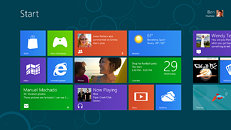Tuesday, April 17th 2012

Microsoft Reveals Main Windows 8 Editions
Crushing previous reports saying that Windows 8 would have up to nine editions, Microsoft has officially announced that its next Windows release, due in the second half of this year, will come in three main flavors, two for x86 systems - Windows 8 and Windows 8 Pro, and one for ARM-based devices - Windows 8 RT.
The 'standard' x86 Windows 8 SKU will target consumer-grade PCs and tablets and will allow upgrading from Windows 7 Starter, Home Basic and Home Premium. Windows 8 Pro, which is aimed towards tech enthusiasts and business/technical professionals, includes everything in the non-Pro SKU and adds goodies like BitLocker and BitLocker To Go, Boot from VHD, Hyper-V, Encrypting File System, Group Policy and Remote Desktop (host). This edition also supports upgrades from Windows 7 Professional and Ultimate.As for Windows 8 RT, it will "only be available pre-installed on PCs and tablets powered by ARM processors" and will boast device encryption capabilities, and touch-optimized desktop versions of the new Microsoft Word, Excel, PowerPoint, and OneNote, but it's going to lack the Windows Media Player, Storage Spaces, or any 'Pro' features.
For more info about the Windows 8 trio see the Windows Team Blog.
The 'standard' x86 Windows 8 SKU will target consumer-grade PCs and tablets and will allow upgrading from Windows 7 Starter, Home Basic and Home Premium. Windows 8 Pro, which is aimed towards tech enthusiasts and business/technical professionals, includes everything in the non-Pro SKU and adds goodies like BitLocker and BitLocker To Go, Boot from VHD, Hyper-V, Encrypting File System, Group Policy and Remote Desktop (host). This edition also supports upgrades from Windows 7 Professional and Ultimate.As for Windows 8 RT, it will "only be available pre-installed on PCs and tablets powered by ARM processors" and will boast device encryption capabilities, and touch-optimized desktop versions of the new Microsoft Word, Excel, PowerPoint, and OneNote, but it's going to lack the Windows Media Player, Storage Spaces, or any 'Pro' features.
For more info about the Windows 8 trio see the Windows Team Blog.

62 Comments on Microsoft Reveals Main Windows 8 Editions
www.pcmag.com/article2/0,2817,2403126,00.asp
Keep in mind that not all hardware has 64-bit drivers and there's software out there that forbids itself from being installed/running on 64-bit operating systems. This is why Microsoft keeps making 32-bit available for desktops/laptops. The time when they shift away from 32-bit is when OEMs (like Dell and HP) stop selling computers with less than 4 GiB RAM.
Like everyone else says and knows is that the Metro UI is great for touch screens and mobile devices. It isn't a desktop PC interface. I hope they give us the option of having the start menu back in Windows 8 when it is released or someone does come out with a way to do it.
32bit will still be around for a while. I use Windows 7 Ultimate 32bit on my old machines even my old IBM Thinkpad T30 and it runs Windows 7 just great.
The systems you see with 512 MiB RAM are often DDR modules which are substantially more expensive than DDR3. 512 MiB is PC2100 is going for about $16 (more than 5 times more expensive per MiB).
Win7 on the left, Vista on the right:
Both install fresh, and fully updated and nothing else. Same exact hardware with 2GB of RAM.
I wouldn't run either on under 1GB of RAM, but on 512MB they both run just fine actually, and Vista with SP2 uses almost no extra RAM over Win7. Slow for my tastes, but usable for sure.